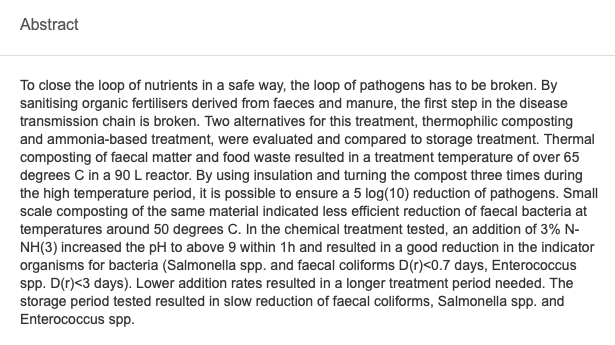Comparison of composting, storage and urea treatment for sanitising of faecal matter and manure
Author: Björn Vinnerås
Year: 2007
Publisher: Bioresource Technology Journal
Abstract: To close the loop of nutrients in a safe way, the loop of pathogens has to be broken. By sanitising organic fertilisers derived from faeces and manure, the first step in the disease transmission chain is broken. Two alternatives for this treatment, thermophilic composting and ammonia-based treatment, were evaluated and compared to storage treatment. Thermal composting of faecal matter and food waste resulted in a treatment temperature of over 65 degrees C in a 90 L reactor. By using insulation and turning the compost three times during the high temperature period, it is possible to ensure a 5 log(10) reduction of pathogens. Small scale composting of the same material indicated less efficient reduction of faecal bacteria at temperatures around 50 degrees C. In the chemical treatment tested, an addition of 3% N-NH(3) increased the pH to above 9 within 1h and resulted in a good reduction in the indicator organisms for bacteria (Salmonella spp. and faecal coliforms D(r)<0.7 days, Enterococcus spp. D(r)<3 days). Lower addition rates resulted in a longer treatment period needed. The storage period tested resulted in slow reduction of faecal coliforms, Salmonella spp. and Enterococcus spp.
Comparison of composting, storage and urea treatment for sanitising of faecal matter and manure
External Link
Open linkRating
Would you like to see other resources here?
Give us your feedback"*" indicates required fields
Still have questions?
You could not find the information you were looking for? Please contact our helpdesk team of experts for direct and individual support.


